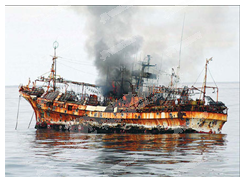The long, lonely voyage of the Japanese ghost ship is over.

A US Coast Guard cutter poured cannon fire into an abandoned Japanese ghost ship that had been drifting since last year’s tsunami, sinking the vessel into waters more than 305 meters deep in the Gulf of Alaska and removing the danger it posed to shipping and the coastline on Thursday.
The cutter’s guns tore holes in the 164-foot Ryou-Un Maru, and then it began to take on water and lean to one side. In about four hours, the ship disappeared into the sea, said Chief Petty Officer Kip Wadlow.
The ship had no lights or communications system, and its tank was able to carry more than 7,570 liters of diesel fuel. Officials, however, didn’t know exactly how much fuel was aboard.
“It’s less risky than it would be running into shore or running into other ships,” coast guard spokesman Paul Webb said.
The US National Oceanic and Atmospheric Administration and the Environmental Protection Agency studied the problem and decided it is safer to sink the ship than let the fuel evaporate and pollute the sea environment.
Ryou-Un Maru was probably among the first wave of the 1.5 million tons of garbage of refrigerators, washing machines, televisions, roofs and fishing nets heading toward North America since last March when a magnitude-9.0 earthquake struck Japan.
As the coast guard was ready to fire on the vessel, a Canadian fishing vessel, the 19-meter Bernice C, claimed the rights to save the ghost ship in international waters.
Plans to sink it were paused so the Canadian crew could have a chance to take the stricken ship. A Canadian official with knowledge of the situation told the Associated Press that the Bernice C was unable to drag it.
Then the Canadian boat left, and once it was about 10 kilometers from the Japanese vessel, the Coast Guard began to fire, first with 25 mm shells, then a few hours later with ammunition twice that size.
State officials have been working to test the danger of garbage including materials affected by a damaged nuclear power plant, to see if Alaska residents, seafood or wild animals could be affected.
小题1:Which of the following is NOT the reason for sinking the Japanese ship?
A.It had no lights or communications system.
B.It might be washed up onto the shore.
C.It was a danger to other passing ships.
D.The oil it carried could pollute the sea.小题2:The plan to fire on the Japanese ghost ship was paused because ____________.
A.the ghost ship was beyond the reach of the Coast Guard’s guns
B.the shells were not powerful enough to sink the ghost ship
C.state officials worried the ghost ship might give out radiation
D.a Canadian fishing boat wanted to save the ghost ship小题3:Which of the following could be the best title for the passage?
A.Japanese ghost ship arriving at US
B.Tsunami garbage heading to US
C.Cannon fire sinking Japanese ghost ship
D.Japanese ghost ship polluting the Pacific